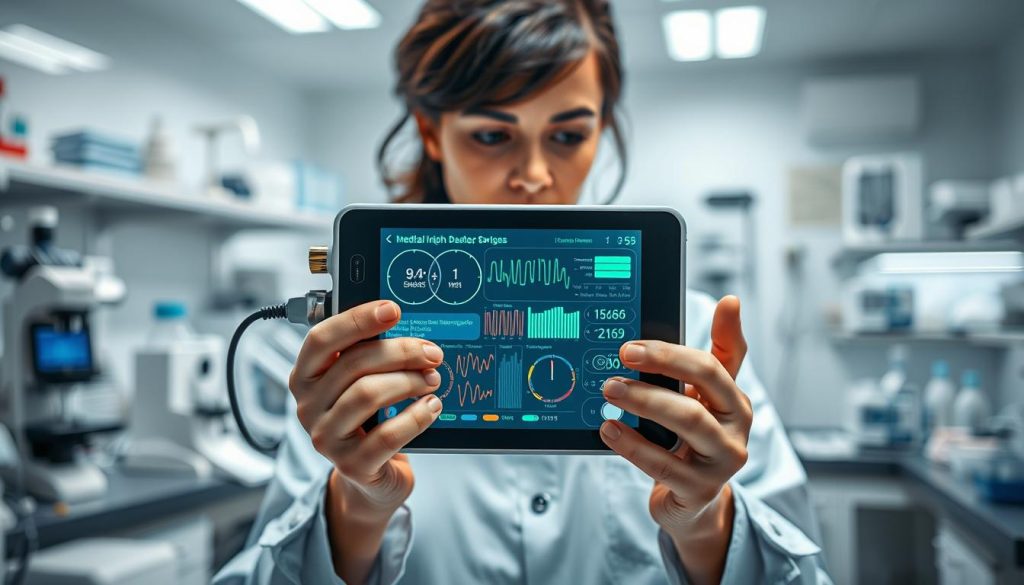Our healthcare world is always changing. New findings change how we see health and treatment. Americans have more choices about their health than ever.
Millions of people in the U.S. live with chronic illness. These ongoing health issues affect families, workplaces, and communities. Knowing symptoms and prevention helps make better health choices.
Modern medicine brings new ways to diagnose and treat diseases. Doctors now have better tools to fight illnesses and help patients. Genetics, lifestyle, and environment all affect our health. This knowledge helps you make informed health decisions.
Understanding Common Health Conditions
Knowing the signs of common health issues can greatly improve your life. Spotting symptoms early means you can get medical help quickly. This knowledge also helps you make smart health choices.
Health problems vary, but many share common signs. Learning about these can help you talk better with doctors. It also lets you support loved ones facing health issues.
Chronic Diseases and Their Impact
Chronic illnesses are big health challenges in the U.S. Over 133 million people suffer from diseases like diabetes and heart disease. These conditions develop slowly and often have subtle early symptoms.
Chronic illnesses affect more than just health. Families and communities face changes in daily life and costs. Healthcare expenses and work productivity also suffer.
Early signs of chronic diseases can be missed. Feeling tired, small pains, and energy changes might seem normal. But, they could signal a serious condition needing medical help.
Mental Health Issues on Society
Mental health problems are now seen as serious medical issues. Depression and anxiety affect millions, impacting work, relationships, and life quality. These conditions are as important as physical health issues.
Mental health symptoms vary widely. Some people show obvious signs like constant sadness. Others notice changes in sleep, appetite, or social behavior over time.
Improving mental health benefits society. It boosts work performance and school success. Mental health support is key for a better community.
The Role of Genetics in Health
Genetics play a big role in health risks. Your family history can hint at potential health issues. But, having a genetic risk doesn’t mean you’ll definitely get a disease.
Knowing your genetic background helps doctors tailor prevention plans. They can suggest screenings and lifestyle changes based on your family history. This can lead to early detection and better treatment.
Genes are just part of the story. Lifestyle choices like exercise, diet, and stress management also matter. Your genes set the stage, but your choices can influence the outcome.
The Importance of Early Diagnosis
Early detection is key to fighting serious health issues. Catching problems early means treatments work better and are less harsh. This approach leads to better health and a better life for many in the U.S.
Getting a diagnosis early can change your life. Early treatments are simpler and have fewer side effects. People who get diagnosed early often recover faster and stay healthier longer.
Benefits of Preventive Health Care
Preventive health care stops diseases before they start or catches them early. It saves lives and money in healthcare. Regular check-ups help doctors find warning signs that patients might miss.
Prevention includes lifestyle advice, vaccinations, and regular checks. These steps find risk factors early. Many insurance plans cover these services for free to encourage them.
Prevention benefits everyone, not just individuals. Communities with strong prevention see fewer chronic diseases. This makes populations healthier and eases the load on emergency services.
Screening for Common Conditions
Screening tests find health conditions before symptoms show. Tests like mammograms and colonoscopies save lives. Heart disease screenings through blood tests and cholesterol checks prevent heart attacks and strokes.

Diabetes screening is crucial since it affects millions. Simple blood tests can spot pre-diabetes, helping prevent diabetes. Bone density scans find osteoporosis before fractures happen.
Screening needs vary by age and risk factors. Your doctor will suggest the right tests for you. Following these guidelines maximizes the benefits of screening.
Technology in Early Detection
Modern tech has greatly improved early diagnosis. Tools like MRI and CT scans reveal problems that were once hidden. They give detailed views of organs and tissues.
Artificial intelligence helps doctors analyze test results better. Machine learning finds patterns in images that humans might miss. This tech speeds up and improves diagnosis.
Genetic testing is another big step forward. It finds inherited disease risks before symptoms appear. Knowing this, patients can take steps to prevent or monitor diseases more closely.
Wearable devices and apps make health tracking easier. They track vital signs and alert users to potential issues. While not a replacement for doctor visits, they offer early warnings.
Managing Chronic Health Conditions
Managing chronic diseases becomes easier when you use a holistic approach. It’s not just about following doctor’s orders. It’s about being active in your care and making changes.
Success comes from mixing medical treatments with lifestyle changes and support. This approach helps people with chronic illnesses live better lives. Many find that taking charge of their health is empowering, not overwhelming.

Medication Management Strategies
Effective medication management is key for chronic disease treatment. It’s more than just following directions. You need to understand each medication’s role in your treatment plan.
Timing is crucial for many medications. Some need to be taken on an empty stomach, while others require food. Keep a schedule for dosing times, food needs, and potential interactions.
Talking regularly with your healthcare team is important. Report any side effects or concerns quickly. Your doctor may need to adjust your treatment based on how you’re doing.
Lifestyle Changes for Better Health
Making lifestyle changes can greatly improve symptoms for many chronic illnesses. Small changes can lead to big improvements over time. Aim for sustainable changes, not drastic ones.
Your diet is crucial for managing many chronic conditions. Anti-inflammatory foods can help with arthritis. Diabetes patients benefit from consistent carb intake. Heart disease patients see improvements with less sodium.
Regular exercise is beneficial for almost everyone with chronic health issues. Even simple activities like walking or swimming can increase energy. Stress management through meditation or yoga also offers physical and mental health benefits.
Support Systems and Resources
Having a strong support network makes managing chronic illnesses easier. Family and friends offer emotional support and help with daily tasks when needed.
Support groups connect you with others facing similar challenges. They offer practical advice and emotional support. Many hospitals and community centers host meetings for specific conditions.
Healthcare professionals beyond your primary doctor can offer specialized help. Nutritionists, physical therapists, and social workers are all important. Don’t be afraid to ask for referrals when you need more support.
Mental Health and Well-being
Mental wellness is key to handling stress, making choices, and connecting with others. It impacts your life in many ways, from work to family. Knowing about mental health helps you care for yourself and support others.
Just like physical health, mental health needs attention. Many face mental health issues at some point. But, there are treatments and support to help you feel better and live well.
Recognizing Mental Health Disorders
Spotting early signs can greatly improve treatment. Symptoms include lasting sadness, mood swings, and trouble focusing. You might also notice changes in sleep, appetite, or energy.
Depression can make you lose interest in things you used to love. Anxiety might cause too much worry, restlessness, or physical symptoms. Knowing these signs helps you know when to seek help.
It’s not a sign of weakness to have these symptoms. Mental health issues are treatable. Spotting them early leads to better treatment and recovery.

Strategies for Improving Mental Health
Building good mental health habits takes time but is worth it. Regular exercise, enough sleep, and healthy eating are key. These practices help your brain and stress management.
Learning healthy coping skills is also crucial. Techniques like deep breathing, meditation, and journaling can help with emotions. Programs teach these as part of mental health care.
Being social is important for mental health. Spending time with loved ones can improve your mood. Joining groups or volunteering can also make you feel connected and purposeful.
Accessing Professional Help
Getting professional mental health help is easier than ever. Therapists, counselors, and psychiatrists offer specialized care. Many insurance plans cover these services, making treatment more affordable.
Teletherapy has made mental health care more accessible. You can talk to professionals from home through video calls. This option helps those in rural areas or with busy lives.
If you’re struggling with mental health, don’t hesitate to seek help. Your doctor can refer you to specialists. Many communities also offer crisis hotlines and support groups for immediate help.
The Role of Nutrition in Health
What you eat today affects your health tomorrow. Nutrition is a powerful tool for preventing diseases and staying well. It’s more than just about losing weight.
Your body needs the right food to work well. Eating well boosts your immune system and energy. It also helps prevent serious health issues. As we get older, making healthy food choices is even more crucial.

Understanding Dietary Needs
Everyone needs different nutrients based on their age, gender, and health. Your body needs proteins, carbs, fats, vitamins, and minerals. These nutrients are vital for your body’s functions.
How much you eat matters too. The right amount depends on your metabolism, activity level, and health goals. It’s not the same for everyone.
When you eat can also affect your health. Eating at regular times helps keep your blood sugar stable. This can give you more energy and better health.
Nutrition’s Impact on Chronic Diseases
Good nutrition can lower the risk of chronic diseases. Heart disease, diabetes, and some cancers are linked to what you eat. Eating more fruits, veggies, and whole grains can help protect you.
Anti-inflammatory foods can also help. Foods like fatty fish, leafy greens, and berries can reduce inflammation. They support your body’s healing.
If you have a chronic disease, nutrition is key. The right foods can help manage symptoms and slow disease growth. Working with your doctor to create a personalized diet plan is often the best way to improve your health.
Popular Diet Trends and Research
New diets pop up all the time, promising quick fixes and better health. But research shows that lasting changes are better than quick fixes. The best diets focus on making long-term lifestyle changes.
The Mediterranean and plant-based diets are backed by science. They focus on whole foods, healthy fats, and lots of veggies. They also let you enjoy your food while staying healthy.
Recent studies are looking into personalized nutrition. They’re finding that genetics, gut bacteria, and individual health factors affect how we respond to food. This means that one diet doesn’t fit all.
Physical Activity and Its Benefits
Moving your body regularly is a cost-effective way to stay healthy and prevent chronic diseases. It’s like medicine for your body and mind. It strengthens your heart, builds stronger bones, and boosts your mood naturally.
Regular exercise can cut your healthcare costs significantly over time. It reduces your risk of diabetes, heart disease, and other expensive conditions. This means fewer doctor visits and less money spent on treatments down the road.
Recommended Exercise Guidelines
Health experts recommend getting at least 150 minutes of moderate exercise each week. This breaks down to just 30 minutes, five days a week. You can split this into smaller chunks throughout your day if needed.
Add muscle-strengthening activities twice a week for the best results. These don’t require expensive gym memberships. Push-ups, squats, and resistance band exercises work great at home.
Start slowly if you’re new to exercise. Even 10 minutes of daily activity provides health benefits. Gradually increase your time and intensity as you get stronger.
Exercise for Different Age Groups
Children and teens need at least 60 minutes of daily physical activity. Playing sports, riding bikes, or dancing all count toward this goal. Active kids develop stronger bones and better focus in school.
Adults benefit most from a mix of cardio and strength training. Walking, swimming, and cycling are excellent low-impact options. These activities serve as effective treatments for stress and anxiety too.
Older adults should focus on balance and flexibility exercises. Tai chi, yoga, and water aerobics help prevent falls and maintain independence. These gentle activities can dramatically reduce healthcare costs related to injuries.
Overcoming Barriers to Physical Activity
Time constraints top the list of exercise barriers for most people. Try breaking workouts into 10-minute sessions throughout your day. Take stairs instead of elevators or park farther from store entrances.
Budget concerns shouldn’t stop you from staying active. Walking costs nothing and provides excellent health benefits. Many communities offer free fitness classes in parks or community centers.
Physical limitations require creative solutions, not complete avoidance. Chair exercises work well for people with mobility issues. Swimming provides joint-friendly movement for those with arthritis.
Lack of motivation affects everyone sometimes. Find activities you actually enjoy doing. Exercise with friends or family members for extra accountability and fun.
Emerging Health Issues and Trends
Modern healthcare is facing big challenges with new health trends and issues. These changes affect how patients get care and how healthcare systems work. Knowing about these trends helps us get ready for future health challenges.
Several key factors are driving these changes. Technology advances offer new treatments. The population is getting older. Environmental factors bring new health risks.
The Impact of Pandemics on Health Care
Recent pandemics have changed healthcare systems worldwide. Hospitals were overwhelmed with patients and had limited resources. Healthcare workers faced high stress and burnout.
The effects of pandemic disruptions still affect patient care today. Many people delayed medical appointments during lockdowns. Cancer screenings dropped a lot during the pandemic. Mental health issues rose among patients and healthcare workers.
Healthcare costs soared during pandemic responses. Hospitals spent a lot on protective gear and isolation facilities. Emergency funding helped many facilities stay open. But these costs created long-term financial problems for healthcare systems.
- Delayed preventive care services
- Increased mental health treatment needs
- Higher infection control expenses
- Workforce shortages in critical areas
- Supply chain disruptions for medical equipment
Telemedicine: A New Approach to Health Care
Telemedicine has changed how patients get medical care. Virtual consultations became common during health crises. Patients can now get care from home for many conditions.
This technology has big benefits for patients and providers. Travel time to appointments is much less. Rural patients can see specialists they couldn’t before. Healthcare costs often go down with virtual consultations.
But telemedicine also has challenges. Some patients face technology barriers. Certain conditions need in-person exams. Reduced physical contact might affect diagnosis accuracy.
- Improved access to specialist care
- Reduced transportation costs for patients
- Faster appointment scheduling options
- Better management of chronic conditions
Health Disparities in Different Populations
Health disparities are a big challenge across different groups. Income levels affect access to quality healthcare. Where you live and your education level also play a role.
Minority communities often face higher healthcare costs. Insurance coverage varies among ethnic groups. Language barriers make getting care harder.
Technology access creates new health inequalities. Some groups lack reliable internet for telemedicine. Older adults may struggle with digital health platforms. These gaps can make health disparities worse.
To address these disparities, we need comprehensive solutions. Community health programs target underserved populations. Mobile health clinics bring services to remote areas. Translation services help overcome language barriers.
- Income-based healthcare access differences
- Geographic barriers to medical services
- Technology gaps affecting telehealth use
- Cultural factors influencing health behaviors
Understanding these emerging trends helps healthcare systems adapt to changing needs. Successful adaptation requires addressing both technological opportunities and persistent challenges. The future of healthcare depends on how well we respond to these evolving issues.
The Future of Health Care and Wellness
The healthcare world is changing fast, offering new hopes for better treatments and lives. These changes will change how we deal with Health Conditions and Medical Implications in the next few decades.
Innovations in Medical Technology
Artificial intelligence and precision medicine are changing how we diagnose and treat diseases. Wearable devices track our health in real-time. Gene therapy offers new ways to fight diseases we couldn’t before. These technologies make healthcare more tailored and successful than ever.
The Importance of Holistic Approaches
Today, healthcare knows that wellness is about body, mind, and spirit. Care plans now focus on the whole person, not just symptoms. This approach leads to better health and happier patients.
Community Health Programs and Initiatives
Local health programs are making healthcare more accessible and educating more people. They focus on preventing and treating problems early. These efforts help everyone get the care they need, especially those who are often left behind.
The future of healthcare will focus more on preventing problems and putting patients first. Keeping up with medical news and living a healthy lifestyle are key. By doing this, we can all play a big part in our own health and wellness.

